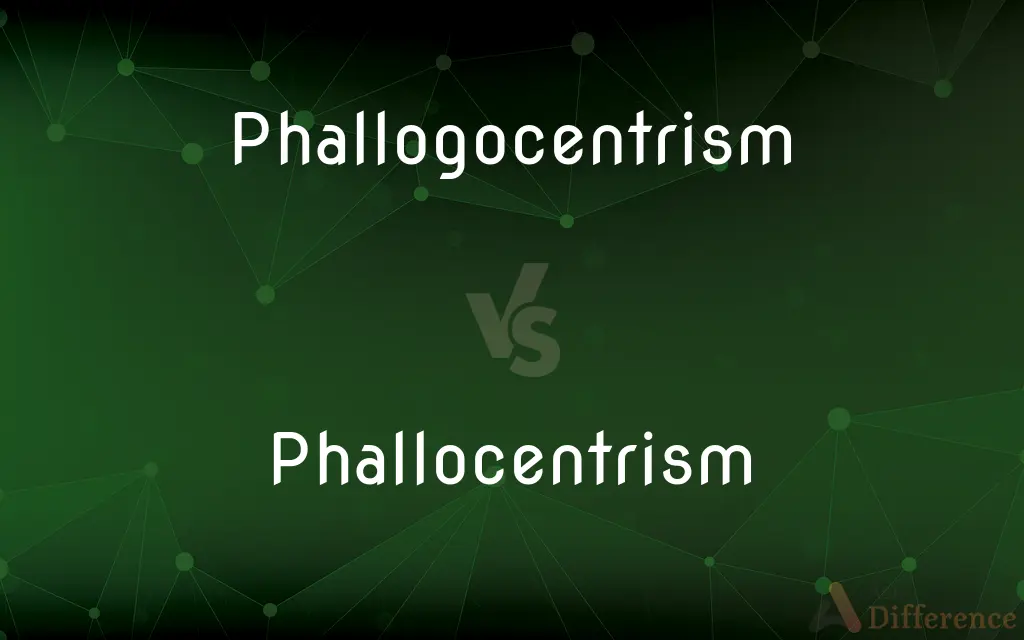Phallogocentrism vs. Phallocentrism — What's the Difference?
By Tayyaba Rehman & Fiza Rafique — Updated on April 14, 2024
Phallogocentrism emphasizes male dominance linked to language and rationality; phallocentrism focuses more narrowly on male dominance in general society and culture.

Difference Between Phallogocentrism and Phallocentrism
Table of Contents
ADVERTISEMENT
Key Differences
Phallogocentrism is a term derived from Derrida's deconstruction philosophy, signifying a critique of the historical association of reason and logic with masculinity. It suggests that Western thought privileges speech and rational thinking as masculine, thus marginalizing feminine ways of knowing. On the other hand, phallocentrism is a broader concept, focusing on the societal dominance of males and the male perspective across various cultural and social settings, without the specific emphasis on language and logic.
Phallogocentrism argues that the structure of language itself enforces male dominance by framing knowledge and reason in terms masculine. This extends beyond mere social practices to the very way ideas and truths are constructed and communicated. Whereas phallocentrism deals more with the practical implications of male dominance, such as in leadership roles, rights, and societal norms, highlighting how these practices prioritize male authority and perspectives.
In literary and philosophical contexts, phallogocentrism is often critiqued for creating a binary between rational, masculine discourse and the emotional, feminine counterpart, thereby undermining women's contributions to these fields. Phallocentrism, on the other hand, may be critiqued in feminist discourses for perpetuating male privilege in more tangible areas like politics, business, and family roles.
Educational systems that lean on phallogocentric values tend to prioritize logical, analytical approaches to learning, often seen as masculine traits. Phallocentrism in education might manifest more visibly through the underrepresentation of women in leadership positions or in certain academic disciplines, reinforcing male-dominated hierarchies.
Activism against phallogocentrism involves challenging the foundations of how knowledge is categorized and valued, advocating for the inclusion of emotional intelligence and subjective experiences as valid forms of knowing. Activism against phallocentrism may focus more on policy changes and societal reforms to ensure gender equality in public and private spheres.
ADVERTISEMENT
Comparison Chart
Focus
Language and rationality
General societal and cultural dominance
Root Concepts
Derives from Derrida’s critique in philosophy
Broader feminist critique of male dominance
Manifestation in Society
Influence in intellectual and philosophical discourses
Visible in leadership, policy, and societal roles
Critiques in Feminism
Marginalization of feminine knowledge and discourse styles
Perpetuation of male privilege across all societal aspects
Educational Implications
Prefers logical, analytical thinking seen as masculine
Male dominance in academic disciplines and leadership positions
Compare with Definitions
Phallogocentrism
A philosophical concept criticizing the male-centered logic in Western thought.
Phallogocentrism is evident in the exclusion of women from philosophical discourse.
Phallocentrism
Feminist critique of societal norms favoring males.
Phallocentrism is challenged by movements advocating for equal rights.
Phallogocentrism
A critique of language’s role in gender bias.
Literary theories often address phallogocentrism to reveal gender biases in texts.
Phallocentrism
The prevalence of male perspectives in media and literature.
Phallocentrism shapes which stories are told and who tells them.
Phallogocentrism
The association of reason and speech with masculinity.
Phallogocentrism marginalizes non-masculine ways of thinking and communicating.
Phallocentrism
The societal bias that prioritizes male achievements.
Phallocentrism is evident in the historical record of scientific discoveries.
Phallogocentrism
The emphasis on masculine forms of knowledge in culture.
Phallogocentrism shapes educational curricula to favor masculine perspectives.
Phallocentrism
The ideology of male superiority in society and culture.
Phallocentrism influences the underrepresentation of women in politics.
Phallogocentrism
A framework in deconstruction and feminist theory.
Feminist deconstruction often targets phallogocentrism to dismantle gendered biases.
Phallocentrism
A focus on male dominance and authority.
Phallocentrism can be seen in traditional family structures.
Phallogocentrism
In critical theory and deconstruction, phallogocentrism is a neologism coined by Jacques Derrida to refer to the privileging of the masculine (phallus) in the construction of meaning. The word is a portmanteau of the older terms phallocentrism (focusing on the masculine point of view) and logocentrism (focusing on language in assigning meaning to the world).
Phallocentrism
Relating to or reflecting a perspective that is predominantly or exclusively male.
Phallogocentrism
(poststructuralist theory) The privileging of masculinity in the use of speech, writing or modes of thought; phallocentrism expressed through language.
Phallocentrism
Dominated or controlled by men
A phallocentric society.
Phallocentrism
(literally) Focus on the phallus.
Phallocentrism
(figuratively) Focus on a male point of view.
Common Curiosities
How does phallocentrism manifest in everyday life?
Phallocentrism appears in everyday life through the prevalence of male leadership in corporate, political, and even familial settings, as well as in the general societal expectation of male authority.
How does phallocentrism differ from phallogocentrism?
While phallogocentrism focuses on language and rationality as masculine, phallocentrism addresses broader societal and cultural male dominance.
Are phallogocentrism and phallocentrism interrelated?
Yes, both concepts are interrelated as they critique aspects of male dominance, but phallogocentrism specifically targets the male bias in logic and language, whereas phallocentrism addresses broader societal norms.
How do gender studies scholars view phallogocentrism?
Gender studies scholars view phallogocentrism critically, as it represents a barrier to understanding and valuing diverse forms of communication and knowledge that include feminine perspectives.
Does phallogocentrism affect language development in children?
Phallogocentrism can affect language development by shaping the types of narratives and language patterns children are exposed to, potentially reinforcing gender stereotypes.
Can the concept of phallocentrism be applied to non-Western cultures?
Yes, while it originates from Western feminist theory, the concept of phallocentrism can be applied to analyze male dominance and gender dynamics in non-Western cultures as well.
What are examples of phallogocentrism in literature?
In literature, phallogocentrism may be reflected in narratives that prioritize male perspectives or themes centered around traditionally masculine concepts of heroism and rationality.
What is phallogocentrism?
Phallogocentrism is a concept from deconstruction that critiques the association of logic and reason with masculinity in Western thought.
What impact does phallogocentrism have on philosophical discourse?
Phallogocentrism influences philosophical discourse by prioritizing rational, logical argumentation—traditionally seen as masculine—over other forms of knowledge and expression, often excluding or marginalizing female philosophers.
How do feminists critique phallocentrism?
Feminists critique phallocentrism by pointing out the unequal opportunities and representation in various sectors such as politics, business, and media, advocating for more inclusive and equitable structures.
What are practical steps to counteract phallocentrism?
Practical steps to counteract phallocentrism include promoting gender diversity in leadership roles, implementing equitable policies in workplaces and institutions, and raising awareness about gender biases in society.
What role does phallocentrism play in the arts?
In the arts, phallocentrism can be seen in the predominance of male protagonists and creators, as well as in the historical focus on male-driven narratives and aesthetics, which influences public and critical reception.
Share Your Discovery

Previous Comparison
Paperboard vs. Cardboard
Next Comparison
Extraordinary vs. RemarkableAuthor Spotlight
Written by
Tayyaba RehmanTayyaba Rehman is a distinguished writer, currently serving as a primary contributor to askdifference.com. As a researcher in semantics and etymology, Tayyaba's passion for the complexity of languages and their distinctions has found a perfect home on the platform. Tayyaba delves into the intricacies of language, distinguishing between commonly confused words and phrases, thereby providing clarity for readers worldwide.
Co-written by
Fiza RafiqueFiza Rafique is a skilled content writer at AskDifference.com, where she meticulously refines and enhances written pieces. Drawing from her vast editorial expertise, Fiza ensures clarity, accuracy, and precision in every article. Passionate about language, she continually seeks to elevate the quality of content for readers worldwide.















































